#<- and the ways in which women weaponize misogyny against their daughters in order to perform a role of power they cannot perform ->
Explore tagged Tumblr posts
Text
When I was about 10 or 12 years old, my favorite time of the year was winter because of the snow. And I made the best snowballs in all of Boston. I was in the best snowball fights, and I always won. This particular day, it was just snowballs flying, it was all you could see, that was all you could feel. Some hit hard, some hit soft and fell down behind your collar. You could feel it in your muffler. And I got home...about 6:30 or 7:00, cause I'd been fighting since 3:00 in the afternoon. And my mother said, "Where have you been?" I said, "I've been having this tremendous snowball fight, it's really fun. And I beat everybody, and everybody beat me. It was a tremendous day." And she slapped my face and said, "Where have you been? Someone said they saw you being chased by a boy." I said, "We were all chasing each other, because we were having a snowball fight." And she said, "You are a liar and a slut." And I said, "I swear to you that I was having a snowball fight." And she didn't believe me. She never believed me. It was as though I was a disease. I have a brother that's ten years older than I am and a sister that's eight years older than I am. So that I was obviously an accident. And it was, "Ganja, I came down with Ganja," you know? And I think that day, I decided that I was a disease. And I was gonna give her a full case of it. That whatever it was that I was, she was gonna have it. Maybe because she hurt me so badly. All that time up till then, I really worked for her to say, "I love you. You're a wonderful girl, Ganja." She could never, ever say that. The only thing she could ever bring herself to say was that I was beautiful. And I loathed my beauty for that...because she found it appealing. But that was a very decisive day in my life, because that day I decided that I would provide for Ganja always. Do whatever had to be done. Take whatever steps had to be taken. But always take care of Ganja.
ganja & hess (1973), dir. bill gunn
#recently watched spike lee's remake da sweet blood of jesus and was genuinely upset by ganja's monologue in that; ->#<- i think rewriting her personal philosophy which she created for herself due to the neglect she experienced as something her father ->#<- told her while also having him as a man explain to her the role than she occupies as a black woman was shoddy writing and ->#<- shitty characterization. esp bc the original monologue already gives us so much to work with in regards to womanhood ->#<- and the ways in which women weaponize misogyny against their daughters in order to perform a role of power they cannot perform ->#<- outside of their role as mother ... thinking thinking.#ganja & hess#horror#it speaks!
5 notes
·
View notes
Text
NOBODY BUT YOU ━゙

⁺◟ CHARACTERS . . . kujo jotaro fem!reader kujo jolyne ‘ holly
⁺◟ GENRE . . . au fluff oneshot
⁺◟ SYNOPSIS . . . ( y/n ) is the princess of ( k/n ) and her family wishes for her to marry an honorable prince from another kingdom in order to form an alliance through marriage. but ( y/n ) has eyes for one man and one man only. her butler, jotaro, who shares a mutual love.
⁺◟ TRIGGER WARNINGS . . . mentions of blood ‘ wounds ‘ violence internalized misogyny ‘ bad parents ‘ killing ( but no one dies ) ‘ weapons
⁺◟ WORD COUNT . . . 4.4k.
⁺◟ COMMENTARY . . . probably a little ooc jotaro for this one because he’s actually pretty kind in this one lol. i hope it’s not too much though. i was told to write a oneshot, instead i felt like i wrote a plot for a short story. this now my second longest fic. there’s just something about jotaro that makes me wanna act up when i write about them. ( f/n ) ‘ father’s name ‘ ( m/n ) ‘ mother’s name ‘ ( k/n ) ‘ kingdom’s name ‘ ( h/n ) ‘ horse’s name

“Jojo, you do not have to hide, I know you’re there.”
A woman spoke up, as she sat on the edge of her bed looking out toward the wide window a few feet from her bed, closed, boarded up from the outside at the discretion of her own mother. Through the cracks, sunlight peered into the room alongside the other much smaller windows on the same stone wall.
She stretched, a sigh leaving her lips followed by a yawn. She looked over her shoulder looking her now wide-open door, there in the door frame stood a man with the height of just about two meters with his back turned to her.
The young woman giggled, “Are you shy, Jojo? Or...do you just do not like my appearance?”
“I am not shy nor do I dislike your appearance, princess. You are just underdressed and it would be appreciated if you were to cover yourself before I can attend to you,” The man answered, his voice was rough and a little mean sounding but she knew he meant no harm by it.
That name. Princess. Her title.
“Jojo, you know you don’t have to call me Princess, right? I mean, we’re friends, right? And I am the same age as you. You can just call me by my name,” She added, standing up from her glamorous bed and walking over to put on a silk robe that was gifted to her from a friend of her mother.
The man hummed, “I do know that...( y/n ) but out of respect for both you and your family, I have to refrain from referring to you so improperly and I must address you by your title.”
Princess ( y/n ), first and only daughter of ( f/n ) ( l/n ) and ( m/n ) ( l/n ) of the lovely kingdom of ( k/n ). A kingdom that prides itself on all of its resources natural and human. And it would one day be all ( y/n )’s one day in the near future.
As she was the only child her mother could bear, she cursed from the beginning of her life to take the throne when she would become an adult, as her mother did not bear a son.
It would all be hers...alongside a man, she would probably be forced to marry from another kingdom to form some type of alliance to share a throne she didn’t want in the first place.
She was a young princess, a bit curvy around the edges with the attention of many suitors from her own kingdom and those from afar. Men near and far would do just about anything to even catch a glimpse from her. Who could blame them? She was young, attractive, strong, could defend herself, independent, and very rebellious against her parents and everything her kingdom stood for.
Her rebellious behavior and independent attitude were not what ( k/n ) stood for and she knew that which made it all the better. She prided herself in not being like the princesses before herself. She didn’t want to be like her mother, she didn’t want to be like her ancestors. She wanted to be much more than that.
She wanted to be free of her duties and to live a quiet life outside of the kingdom. Away from the stress. Away from the suitors who wanted nothing more than to marry her, turn her into a powerless walking baby carriage, and strip her of her independence and strength by force, if necessary.
( y/n ) had learned from a young age to not trust the men around her, for that very same reason. Not even her own father, who wanted to marry her off years ago to ensure the kingdom would survive another 100 years and he would get grandchildren.
She had been failed by people she had trusted and was starting to lose hope that there was really anyone out there who she could trust.
And that’s when she met him. The man who stood at her door frame with his back facing her. The man who always made her heart flutter no matter what he did.
Jotaro.
A descendant of the Joestar bloodline, the direct descendant of the great and gentle soul Jonathan Joestar who fought against evil to avenge his father’s tragic death, dying himself before it was all done. Grandson of the cocky bastard whose legendary battle stories traveled across the world, Joseph Joestar.
Despite his bloodline, Jotaro had seemed to be the opposite of both his grandfather and his great-great-grandfather. He was, at first, delinquent. His name was known across the kingdom fairly quickly for a young man.
It all had started after a misunderstanding. A man had swung at him first and he simply defended himself, beating the man almost to death without even batting an eyelash. The incident quickly became known across the kingdom.
He would get into much more trouble after that but nothing that brought the king’s attention to him, that was of course before ( y/n ) had suddenly became involved.
The young princess had left the castle without her guards when she was supposed to be asleep. She had wandered into a pub on the outskirts of the kingdom in disguise, where she danced on top of a table until one of the few customers at the pub had tried to grab at her.
As the unknown man grabbed her wrist with one hand, with the other he pulled out a small dagger that was clearly homemade as the blade looked a bit uneven, but it sure was sharp as it pierced through the skin on her neck and drew blood.
The rest was a blur to her, the next thing she remembered was waking up in someone else’s bed, being looked after by a fair-headed woman with emerald eyes with a gentle smile. She learned her name, Holly.
Before she could explain, her son walked in, Jotaro. He had explained what happened and why she was here, as it slowly started to come back to her. When she returned back the castle, there she saw a huge search for not only her but a search for Jotaro as well.
Before she could find him and warn him, he was already found and arrested. There she ran, she ran home to the castle and that’s when she saw a sight that still haunts her dreams to this day.
Jotaro in a guillotine with both of her parents eagerly watching the scene before them. She let out a terrible shriek, gathering everyone’s attention before she ran through the crowd that was slowly forming to watch Jotaro’s execution. As she laid her head under the blade, crying, “DAMN YOU! DAMN YOU ALL TO HELL! LEAVE HIM BE! THIS MAN SAVED MY LIFE! YOU KILL HIM, YOU KILL ME! YOU’LL KILL THE FUTURE OF THIS KINGDOM AS WELL!”
He, along with everyone else, was surprised by her actions. The princess of ( k/n ) had laid her head down on the guillotine in order to save a commoner.
The crowd began to murmur, rumors began to spread. The execution was called off and Jotaro was set free...or at least he thought. While the crowd settled down, ( m/n ) had offered him anything he had wanted in order to keep him out of the picture, knowing he would ruin ( y/n ) precious image in the other kingdoms.
He declined her offer, saying those words that ( y/n ) would never forget, as it was the first moment she had ever felt her heart race for someone. It was like she knew she had loved him.
“I don’t want your money, your jewels...I don’t want anything you can give. What you can do is listen to your daughter, Queen ( m/n ). It doesn’t seem like you don’t do a lot of that. Take care, Princess ( y/n ).”
“I’m decent now, Jojo. You can turn around,” ( y/n ) added, leaning against one of the nightstands, folding her arms across her chest.
He looked around her room, “It is awfully late for you to be just waking up, your highness. Where are your maids?”
She sighed, “I sent them away. I didn’t want to get out of bed today. I told them I have come down with something and I do not wish to get them sick. Getting those old women to leave me alone is such a pain in my sides. They kept insisting until I had to literally push them out of the room and shut the door. I can’t catch a break around here I guess.”
“Well, you are meeting another suitor today, your highness,” He pointed out, his eyes had traveled down to his feet. Just saying those words made him sick. He hated when young woman had to meet suitors. Every prince that had walked through those doors didn’t want a companion to spend the rest of their days with, they wanted a woman they could return to whenever they wanted. He knew boys his age, they didn’t want marriage and they damn sure didn’t deserve the woman standing before him in a silk robe.
When she asked him to be her butler, he declined. He didn’t want to work for the very kingdom he didn’t want to be apart of and wanted him either dead or behind bars in a dungeon. But she didn’t give up and she had bothered him for weeks on end, begging him to be her personal butler and he would not have to answer to any of the kingdom staff and he could live on castle grounds with his mother if he pleased.
Growing tired of her begging, he finally accepted under the condition that his mother would not be treated like a maid, which ( y/n ) accepted as she had grown fond of Holly.
After spending more time with her, he realized his true feelings. The way his heart raced and how hard it was to hide even the slightest blush when she called him by his nickname, Jojo. How she trusted him even more than she trusted the castle staff who she had grown up knowing. How her soft hands would graced his own.
He had accepted that he was in love with her almost a year ago before her mother began to truly force courtship down ( y/n )’s throat in order to take the throne. She didn’t take it laying down, which was another thing he loved about her. Her rebellion toward her family and the traditional way of things.
“Oh, that’s right. Some wealthy prince where to buy his way into a marriage he doesn’t plan on putting effort into. I’ll pass,” She joked, making Jotaro give her a small smile.
“Did the cold Jotaro just...smile?”
“Shut up.”
“I’m just messing with you, Jojo. So what should we do today instead of meeting my suitor? I was thinking we make a break for it with ( h/n ) and run out of ( k/n )’s gates at full speed. They’ll never be able to catch us!”
He raised an eyebrow, “Are you crazy? You’ll get me killed. Your mother already has a bounty on my head and is ready to kill me off at any moment. We are not to leave ( k/n ), especially not together. There are already rumors still floating through the kingdom about the two of us.”
Her face fell. The rumors, she almost forgot about those. The rumors of them being in a relationship. The rumors of him corrupting her and taking her innocence. While they hurt his image, they had pretty much tainted hers.
She would pretend they wouldn’t hurt, but they did, they always did. He knew that and he offered to disappear but she never wanted him to leave her or she would truly never trust anyone.
Jotaro let out a sigh, walking over to her, putting a finger on her chin to make her look up at him. It sent chills down her spine, looking at him like this with those blue-green eyes of his. He was even more gorgeous up close.
“Do not be sad, your highness. A rose bath will make you feel nice. I’ll fix your bath. While you bathe, I will clean your room. And then after, I will escort you to the main hall where your parents are waiting for you. ”
She nodded, “Thank you, Jojo.”
“No problem.”
He did just as he told, fixing her bath, pouring hot water into her wooden bathtub, filling it with rose red and pink rose petals before heading to her room where he “cleaned” as she bathed and relaxed. She was pretty much a clean woman already, there was much to clean besides some dusty spots. His eyes kept darting to the boarded-up window.
‘They truly do wish to lock her away like she is some animal, huh?’
The door to the room opened to reveal a familiar-looking woman, who wore a scowl on her face. ( y/n )’s handmaiden, “You should not be in here alone with Princess ( y/n ). You know the rules, Kujo. Should we relay them to you once more?”
He rolled his eyes, “I do not need your rules. You shouldn’t assume the worst of your princess now, should you?”
“Who are you to threaten me?!”
“You said my name, you know who I am. Princess ( y/n ) is currently in the bath and is getting ready to―”
The handmaiden blinked, “DID YOU SEE HER INDECENT?!”
“You are awfully protective for someone who jumps to conclusions.”
“Isabel, enough!” ( y/n )’s firm voice sounded through the room. The two looked over toward the bathroom door to see the young princess wearing nothing but a towel wrapped around her body tightly, covering all it needed to, “Jojo has done nothing and has been always been nice and expected my boundaries, unlike the suitors you, mother and father try to marry me off to. He did not see me indecent and nothing has happened. Please do not assume the worst of him. He is only doing the job I asked him too.”
With a regretful look on her face, she turned to him. Their eyes locked, “You may leave now, Jojo. I should get ready for my suitor.” She turned to Isabel, “You too. I wish to dress myself this evening.”
The two bowed, going toward the door. Isabel had walked out, leaving the two young adults for a moment. She gave him a little smile, “I’ll be fine.”
“You’re planning something...aren’t you?”
“You know me so well. Wear the cutest suit you can find at home. I’ll be looking forward to it.” She gave him a wink. He did as he always did, pretended not to care and just walk off...before...he stopped, “Thanks for sticking up for me.”
“No problem. It was wrong of her to accuse you like that.”

“Have I told you how beautiful you look tonight, Princess? And your dress really compliments you in all of the right ways.”
Silence.
“Princess? Princess ( y/n )?”
The young princess rapidly blinked, turning to the young man standing to her side dressed in an outlandish suit that was crafted to his tastes. She shook her head, “My apologies, my head seems to be somewhere else at the moment. Could you repeat what you said?”
The young prince cleared his throat, gesturing toward her dress, “I said that you look absolutely beautiful tonight. Your dress truly compliments you in all of the right ways.”
( y/n ) looked down to the blush-colored dress she wore, one she pretty much squeezed herself, the tight corset crushing her sides only added to the extreme discomfort she felt along with being with him, the newest suitor.
Prince Andrew from a neighboring kingdom known for their crops. A man on the shorter side with ginger hair and pretty bad achy across his face. He was probably the least interesting of the many suitors who had asked for her hand in marriage so it was easy for her to get lost in her thoughts. All he talked about was how gorgeous she was and how an alliance between their two kingdoms would be amazing.
He lost her after hello. Besides she was too busy thinking about the man who occupied her heart. His smile, his eyes, his charm.
( y/n ) gave the young ginger prince a small smile, patting him on the back as a friend, “Prince Andrew, you must forgive me but I want to be honest with you because I see something in you that I never saw in any of my other suitors.”
“A possible alliance and marriage?” His eyes sparkled.
“Heavens no. Don’t get me wrong, you’re a sweet, smart, and talented man and I know any woman would be happy to be your queen, but I’m not one of them. We could be really good friends, but I don’t see a future marriage between us. We can still have an alliance, just not one through marriage,” She explained.
His head fell just below his shoulders and a sad expression printed on his face. She rubbed his back gently, “Prince Andrew, please do not sad.”
“There is a man who holds to key to your heart already, isn’t there?”
She stayed silent, letting out a sigh.
“The man...who holds your heart, is he a commoner?”
“He is.”
“That is why you do not wish to meet suitors. Your heart belongs to a commoner. I see. Does...does he love you too?”
She shrugged her shoulders, “I’m not sure. I don’t think so.”
“The commoner that you adore, is he Jotaro Kujo of the Joestar bloodline?”
“How did you...”
“We know all, Princess ( y/n ). When you threw yourself under a guillotine for him, talk began to spread not only through your kingdom but through all of the kingdoms. It is why your parents are ready to marry you off so fast. So you don’t end up marrying him and mixing your precious bloodline with that of the shameful Joestar bloodline. Why do you think he has yet to show up despite being your personal butler?”
“You know something I don’t know. Prince Andrew, I demand you to tell me! WHY HAS HE NOT SHOWN UP?!”
She grabbed the ginger by his collar, her hands shaking in fear of the unknown. Andrew let out a shaky sigh, “We were told Jotaro would be taken care of. He had two options. He could either let you go and leave as nothing happened or...”
“They’ll kill him. Andrew where do they plan to kill him?!”
“I’m not sure. I saw soldiers marching to the east gate.”
“That’s not far! Thank you so much, Andrew!” She released the ginger’s collar, placing a sweet kiss on his cheek, causing him to blush a deep shade of red.
She ran in the way of the east gate, praying that she would make it in time. Her dress starting to rip and shred in the tree branches and bushes, while it began to blackened from dust and dirt. During her run, she lost both her shoes and most of the bodice of her dress which was probably stuck on a stray tree branch. Cuts and scratches covered her arms and collarbones, but none of the stings got to her. The adrenaline in her body being the reason.
In her vision, she could see it. East gate. She could see a few torches and horses. As she got closer, running now through the grass she saw two soldiers, fully armed with swords in a hand the reigns of their horse in the other.
On the ground, in front of the soldiers there, he was in a now tattered suit, Jotaro.
“No...”
“We are giving you the chance to live and leave Princess ( y/n ) so she can be happy. Don’t you want her to be happy?” One of the soldiers spoke.
Jotaro whipped the corner of his mouth, glaring at the soldier, “Of course I want her to be happy but why would she happy among you liars and corrupted people. I’m not leaving this shitty kingdom without her. If you’re going to kill me then kill me. My mother will still be around to watch over ( y/n ) for me until we meet again in the afterlife because I know that she can protect herself from here on out and she’ll never let a man walk all over her ever again whether I walk out of here alive or not. And because I never got to say it allowed to her, I want to say it now so I do not die with regrets. I have come to the terms with it. I love her. I love ( y/n ).”
His confession made her heart race, as tears formed in her eyes. He did love her back. She made herself now, stepping out of the tall grass, Jotaro seeing the tattered blush-colored dress first and then her face, “ ( y/n )! What are you doing here?! Why aren’t you at the ball?!”
The young princess walked to his side, kneeling next to him, taking his hand into hers, “I said it once and I’ll say it again no matter how many times it takes. You kill him, you kill me! I wish for the same brutal death that he gets because I love him too!”
Jotaro looked to the young princess with a shocked look. She shared his feelings.
“And if I’m not marrying him then I do not wish to marry at all! Now take your sword and finish us! Do your worst!”

“WOAH! MOM DID THAT?! SHE’S SO COOL!”
Jotaro let out a little chuckle watching his now seven-year-old daughter jump and down in glee, repeating ( y/n )’s iconic phrase that she had become known for through her ongoing reign as queen of ( k/n ).
Of course, she went on to reign as queen to become queen after marrying the love of her life. It was a long road to get to that point, it was an even longer road to get her parents to let her marry him. It took a lot convincing on both sides but by some miracle one day the former king and queen caved in and said yes, as they saw that Jotaro had made ( y/n ) the strong woman she was today.
Not long after their marriage, ( y/n ) and Jotaro had become queen and king of ( k/n ). And on the day of their coronation, ( y/n ) discovered she was indeed pregnant.
Nine months later, the sweet baby girl was born.
Jolyne.
She was Jotaro’s pride and joy. ( y/n ) had already predicted that Jotaro would love her more than anything, as she watched him hold her the day she was born for hours, barely even speaking to her. Watching his eyes spark as he looked down at his daughter, it warmed her heart.
“Princess, I don’t see why you’re so excited to hear that part. I’ve told you the story of how your mother and I began dating many times.”
The black and green haired girl sat down on her bed, and folded her arms across her chest, “It’s still really cool! She took you in and made you a king.”
“That’s not―”
“That’s exactly right, Jojo,” A sweet voice chimed from behind the father-daughter duo. The two looked toward the door with the same look on their face. It was easy to tell they were related.
“MOMMY!” Jolyne climbed out of her bed, running to her mother, hugging her tightly. ( y/n ) smiled, hugging her daughter back tightly, “How is the Princess of ( k/n )?”
“Great! Just listening to Dad tell the story about how you two started dating. I want to be like you when I grow up.”
She patted her daughter’s head, “And you will be one day when you become queen. You’ll be even better than me. But it is time for the little princess to fall asleep and go to dreamland while Daddy and Mommy retire to our own chambers.”
As if it was on cue, Jolyne let out a yawn, rubbing her eyes. She slowly let go of her mother, returning back to her bed to allowing Jotaro to tuck her in tightly.
“Tomorrow, we will go to the stables and ride horses.”
“Yay!”
“Good night, Jolyne.”
“Good night, princess.”
“Good night, Mommy and Daddy.”
Jotaro kissed the top of Jolyne’s head, standing up from her bedside, blowing out the candle next to her bed, and walking out of the room with his wife. He closed the door gently, slowly inching away from it before sweeping ( y/n ) off of her feet, the woman let out a small yelp.
“J-J-Jotaro!”
“Does this bring back memories?”
( y/n ) giggled, wrapping her arms around her husband’s neck, “Of course it does. It was actually this very hallway that you picked me up and carried me down. I remember it like it was yesterday. It was the night you “tainted” me forever, as my mother says.”
“All I did was kiss you.”

“J-J-Jotaro!”
“Yes, Princess ( y/n )?”
The man chuckled lowly, pressing a gentle kiss to her lips, catching her off guard. He slowly pulled away, a dark blush formed on her cheeks as she stared at him with surprised eyes. “D-D-Do you just go around kissing girls like that?”
“Only girls named ( y/n ) ( l/n ),” He answered.
“Never took you for a romantic. You were cold and quiet. You barely even spoke to me back when first began meeting,” She pointed out.
His blue-green eyes looked into her ( e/c ) ones, “But you saved me. I’ve always been the one saving others and you saved me. You were the first person to risk your own life to save mine. Just like you, I didn’t trust many. And you walked into my life and I saved you, I expected it to end there but then they tried to kill me but you almost threw your life away for me. YOU, the Princess of ( k/n ), almost threw her life away for me, a commoner. Something changed in me that day. For a while, I didn’t know if it was good or not. But now that I have in my arms like this, I know it’s a good thing, Princess ( y/n ).”
“There you go with the title again, ruining the moment. You'll never learn huh?"
"I'll call you by your name when you marry me."
"That will be pretty soon."

⁺◟ BACK TO NAVIGATION . . .
#jjba#jojo's bizarre adventure#jojo no kimyō na bōken#kujo jotaro#jotaro kujo#jotaro x reader#jotaro x y/n#jotaro x oc#jotaro oneshots#jotaro scenarios#jotaro imagines#jjba oneshots#jjba scenarios#jjba imagines#jojo oneshots#jojo scenarios#jojo imagines#tw ― blood#tw ― wounds#tw ― violence#tw ― internalized misogyny#tw ― killing#tw ― weapons#night rather than day ── 𝘱𝘰𝘳𝘵𝘧𝘰𝘭𝘪𝘰. 𓂃 ★☆
66 notes
·
View notes
Text
Bridget Jones: In Company with Beckys and Karens

We can start with unpacking your luggage Bridget, you are gonna need the help but pull your weight into it.
Hi Bridget, looking good as always. Long time, huh? I guess it has been awkward after I have given your husband Mark a beat down and sent roses to his first ex-wife and your ex supervisor Perpetua. I think it’s time we talk. I understand life hasn’t been easy for you: your mother is nutty and a misogynistic racist, your father is friends with pervs and found it astounding you had a real boyfriend (Colin Jones won’t escape my ire), your friends are trash frankly especially the smug marrieds, you are insecure over a body that actually isn’t really a outlier to the dominant white patriarchal standard of cis female beauty (by the way, have you heard butt implants exist now?), your jerk husband is very negging and in the original novel he “compliments” you by pulling “Not like other girls” on you and all your other boyfriends see you as a piece of ass and don’t respect you, your uncle gropes your ass for how long and his wife pesters you about your body and past singleness.
But let’s be real Bridget: those wilderness years where you feared becoming a sad spinster were endured in a spacious apartment where your bedroom was separate from the kitchen AND the living room without a roommate (hope I get this lucky), you haven’t wanted for nothing growing up in a affluent and safe town in a single-income family (your dad was also a accountant), you were given blonde hair and blue eyes (traits that have been considered desirable for multiple millenniums), your body was always curvier than you’d like but you had no problem finding a lot of clothes in your size and didn’t have a doctor fat shame you (now smoking and drinking...), I learned from Jameela Jamil that actually Britain of your teens and twenties was a racist time, you got to go to college (granted it was in the University of Wales, which wasn’t “prestigious” enough for Daniel Cleaver) and you got a stable office job at a publishing company that you often fudged (most WOC can’t fuck up like you and thrive in this culture), and you never been in most situations where you didn’t have to look in the media or in the room and find yourself out of place.
Well now it’s 2020, have you heard of Black Lives Matter? This shitstorm of a year has been forcing us to confront issues regarding the patriarchy, capitalism, white supremacy, putting people of privilege to question their own involvement in prejudice, and a highly militarized law enforcement. Has Mark spoke of this to you? I haven’t heard a peep from you and Helen Fielding. I must say, I was glad not to hear either you or Helen say anything transphobic (fuck off JK Rowling). I think you heard of these memes going around called “the Karen” and “the Becky”, you must be wondering what the difference between the two are and was at a loss to counsel your smug married friends or your racist ass mother crying over being called Karens. Here is the trouble, I think you are likely a Becky and have the potential to turn into a Karen, after all you dream of weaponizing your mother’s embarrassing casual racism and thin privilege against Perpetua and Mark Darcy, and you dabbled in the White Savior trope for a hot minute in Thailand (oh and playing an idealized Ivanka Trump to your mother in the 3rd film?). Also let’s face it, you are compared to every confident, capable woman in your universe (surprise they are all bitches) or the non-Anglo British or non-British conquests of Daniel or Mark’s ex wife.
Let’s talk about the traits of a Karen and Becky and how they are related, Bridget.
Karen
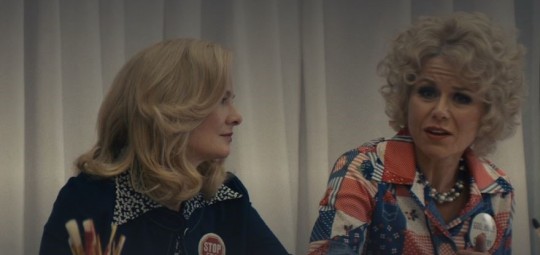
Ah the Karen, or as Tv Tropes called her the “Obnoxious Entitled Housewife”.
Here is a bullet point of traits the Karen possesses according to The Take:
She’s an entitled, middle-aged, upper or middle class, often White woman.
She mistreats those “beneath her” like wait staff and customer service, classism at it’s most in-your-face and irritating.
She follows the rules, except the part about expired coupons.
She sticks to the hierarchy, using it to prop herself up.
Often passive-aggressive and judgmental.
She puts up the image of the perfect fragile woman, even if she instigated a crime.
Narcissistic behavior.
She considers herself the policewoman of human behavior.
She often lacks a understanding of different races and classes.
She projects her own misery on those who cannot fight back against her.
She is often a Know Nothing Know It All.
This probably hits home Bridget, they describe your mother, Auntie Una, and smug married friends. When you look at the news from my country, you tell yourself every time they wonder about your marital status or when you will have children, you are likely keeping them from calling the police on a black kid selling cups of water. But Karen is merely the more outwardly mature version of a trope you definitely fit and her name is....
Becky
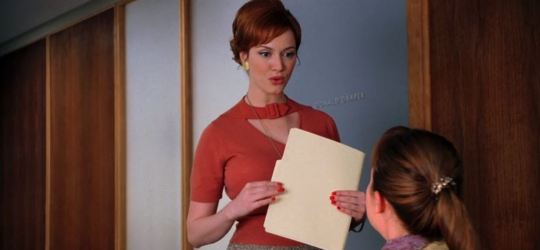
Hey Bridget, your hair may not be as shiny as you like but according to a White Supremacist structure, you have “good hair”. You dealt with your literal Beckys Bridget (hi book version Rebecca Gillies), but what “Becky” refers to is to a often ditzy, somewhat entitled, young, white woman who lacks real racial understanding. It refers to how our society props up an image of idealized white femininity, sometimes it bleeds into women not considered “ideal” themselves.
By the way, the redhead featured is Joan Holloway. She isn’t ditzy like a Becky but her Queen Bee behaviors, her reliance on her pretty privilege, lack of racial understanding, and her adherence to femininity and social climbing make her a modern-day Becky Sharp (also an earlier Becky).
Remember when you contemplated introducing Mark as “a middle-aged prick who was lefty by his cruel raced ex-wife”? Wasn’t that kind of racist of your Bridget? Not so different from your mother? Here are a few traits:
Becky can be oblivious to her surroundings (and the feelings of others less advantaged than she).
She usually gets away with trouble due to her idealized Anglo looks.
Willfully naïve.
Conventionally feminine.
Often spoiled.
She and her interests are basic and mainstream (sounds like milk tray, Colin Firth binge fests, shopping, numerous garden parties).
She is often cushioned against disappointment (in the 3rd film we were all supposed to be on your side while your bitchy boss fired you for very good reasons).
Unaware of other’s needs because she is so used to things going her way.
Her ignorance can be just as frustrating and harmful as a Karen’s maliciousness.
Becky is given real growth in fiction, to learn to be better.
The thing is Bridget....where is your character development? It seems you hardly achieve much confidence, intellect, or maturity. In the 3rd film, I was shocked you were in your forties, I thought I was looking at a overgrown teenager. Perhaps you are a victim of Flanderization?
Karen and Becky
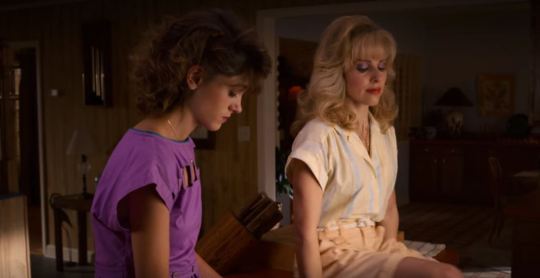
Now we look at how bad things could get if you don’t check your privilege soon enough Bridget, yes a lot of Beckys run the risk of becoming Karens. This is Mother-Daughter pair, Nancy (daughter) and Karen (Mother) Wheeler, I put them because of the connection but they don’t fit the stereotype (despite one of them having the name) but they are privileged white women talking about their shared experiences with misogyny. And most Beckys and Karens had to deal with misogyny, both outside and internalized, the issue being they don’t see how other people had to suffer due to prejudice.
Now Bridget, with your mother, you are a Becky while she was always a Karen. That is you are ignorant about your white privilege while your mother runs on casual racism, ignorance, and Tory politics. Ask her or Mark about the race riots, ask her and Mark about Enoch Powell. And yes Julie Bindel, a fellow compatriot of yours, complained about the Karen label but honestly it’s scary about how some of your peers chortled over racist jokes or your mother’s antics but get up in arms when people of color in service jobs call ya’ll out. But there are some Karen traits you show already, you will weaponize your place in the pecking order to beat down on another woman, like with Perpetua and Mark’s first ex-wife.
What does this say about you?
I will be the first to admit, I would’ve jumped up and cheered if I woke up in your body. You are conventionally prettier, but lately I recognized my own points and one of them is flair and the ability to read folks. Believe it or not Bridget, you are seen as a role model and a relatable figure to folks (and your last film ran on Millennial bashing, hating on younger women is not a good look). Maybe these Zoomer teens were on to something? Bridge, they will save us, we need to do the work.
Now maybe you can take a cue from Dr. Rawlings on how to support and critique women Bridget? In the meantime, I think if I run into you, I’ll run if I see your mother.

Not all is lost, I see you are a reader, maybe put down the self-help books and do some self-improvement by learning how to be a better white ally. I would like to read Hood Feminism (Mikki Kendall is a delight on Twitter). Meanwhile, if you do release a 4th movie in the future: don’t release it during a U.S. election year (I have had enough right wing presidents to last my teens and twenties).
#Bridget Jones#Bridget Jones's Diary#Karens#Karen#Becky#Beckys#white women#White Privilege#racist patriarchy#Casual Racism#Women in Media#character analysis#your fave is problematic#character intervention
4 notes
·
View notes
Text
Cinderella! Dead?

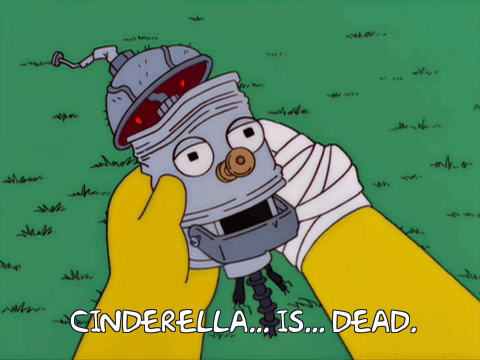
And by that, I mean:
Cinderella is Dead by Kalynn Bayron!
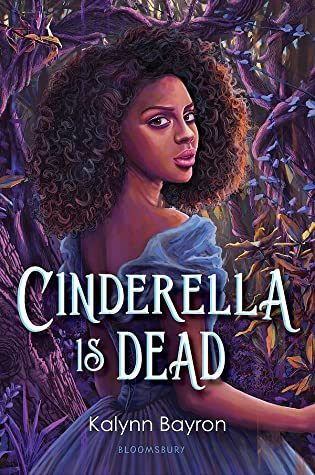
I do love the Brothers Grimm fairy tales, because, well, all German students cut their teeth translating bits and pieces of the the Kinder- und Hausmärchen. You have never known true suffering until you’ve had to come up with an original translation for bits of Schneewittchen or Rotkäppchen. Oh the horror. I mean, it’s not as bad as doing original translations of Goethe, and definitely not as fun as translating Struwwelpeter - and that was only fun because I was the only person in my class who got that the stories were meant to be a satire on contemporary children’s morality tales. I mean, Mark Twain did his own English translation! The original byline was Lustige Geschichten und drollige Bilder mit 15 schön kolorierten Tafeln für Kinder von 3–6 Jahren (funny stories and amusing pictures with 15 color panels for children ages 3-6). Once you see the Struwwelpeter stories as parodies of sickly sweet moral lessons for kids, it’s pretty clear that the actual lesson of the Struwwelpeter story (don’t suck your thumbs or else a crazy dude with scissors will literally cut them off your hands) is more dark humor than actual story to teach your kids a lesson and -
Wait, where am I?
Oh. Yes. A blog where I review books. I should probably get on that.

So yes, Cinderella! A story known the world over, with thousands upon thousands of different versions across the globe. The oldest known being the tale of Rhodopis from ancient Greece, and the story of Ye Xian from China that dates back to the AD 860-850 or thereabouts, which itself is similar to stories found around Southeast Asia, like the story of Bawang merah dan bawang putih or the Vietnamese story of Tấm Cám and shit I wandered off again. Sorry. Fairy tale history is quite fascinating. Anyway, the first European version of the Cinderella story was published in Italy in 1634, but the story that we know best mostly comes from the 1697 French version by Charles Perrault in his Histoires ou contes du temps passé, avec des moralités (don’t look at me, I learned German, remember?). Perrault’s Cinderella story, Cendrillon ou la petite pantoufle de verre (Cinderella and the little glass slipper, thanks wikipedia!) features all of what we know of as the traditional Cinderella story: the evil stepmom and stepsisters, the ball, the glass slippers which sound both a) painful and b) super dangerous - seriously, how could you even dance in a glass slipper without breaking them and having shards of glass stuck in your feet à la Die Hard?

Anyway. Cinderella. Very traditional story, mostly French. The Brother’s Grimm version of Cinderella is...weird. Mostly because her name is Aschenputtel, which sounds like something you hack up with a phlegmy cough. (To be fair, though, that’s most German...). There’s also a magic bird instead of a fairy godmother, Aschenputtel’s father is very much alive and doesn’t seem to give two shits about how his new wife and stepdaughters treat his own kid and the slippers are made of gold instead of glass. Gold sounds a sight more comfy than glass, but also super heavy. How can you dance in shoes that weigh roughly 27 pounds / 12.4 kilograms each? That’s assuming that each gold shoe is roughly the same size and density as a standard gold bar and -

OK. Listen to Rihanna, Cromulent Book Reviewer. Cinderella is Dead by Kalynn Bayron!!
In the land of Marsailles, Cinderella is dead, and has been for the past 200 years. Her story hasn’t just become canon - it’s become law. Every year all girls at the age of sixteen must attend the mandatory royal ball, where the men are allowed to oogle them and pick out which one they want as a wife. The girls don’t get a choice in who picks them - once you’re selected by a man, you’re his, and if no one picks you, well...you’re only allowed to attend the royal ball three times before your family has to surrender you as a “forfeit.” Forfeits are never seen or heard from again. Attending the ball more than once is considered an embarrassment. And if you don’t want to get picked? Too bad. The girls of Marsailles have no choice - non-attendance will get you thrown in prison, and likely executed, while their families have all their possessions stripped from them. So...have fun at the meat parade, girls! Fingers crossed you don’t get picked by an abusive prick!
Sophia Grimmins (I see what you did there, Kalynn Bayron) doesn’t want to go to the Ball. All Sophia wants is to marry her best friend, Erin, and be free to have a future with her. But in Marsailles, being gay is not OK. It’s straight relationships only, Cinderella married a prince, and therefore, women can only marry men. Men marrying men and women marrying women? Forbidden. No not pass go. Do not collect 200 dollars. Instead, go straight to forfeit town. Sophia pleads with Erin to try and escape their hometown of Lille and head off into Belgium the Forbidden Lands. But Erin doesn’t want to escape - she just wants to keep her head down, go through the whole disgusting selection process, and stay safe. Well, as safe as you can with a husband who is brought up to be an abusive, misogynist prick like many men in Marsailles. Seriously, with the exception of like, 3 characters, pretty much all the dudes in Marsailles are the worst. Not just the worst, but like,

Euch. And they’re the worst in a way that all women and girls will immediately recognize. Is it terrible that I’m kind of glad for the current pandemic because mask wearing has cut down the instances of strange men telling me to smile significantly?
Anyway, the day of the Ball has arrived, and with Erin refusing to escape, Sophia has no other choice - she has to go. Her parents have gone into debt to provide her with the best hair, makeup and dress in order to increase her chances at being chosen. Sophia’s parents know about her feelings for Erin, know that she’s always preferred to have a princess rather than a prince, but even though Sophia pleads with them to do something, anything to get her out of going to the Ball, they refuse. Her parents go full Mandalorian on her, telling her that this is The Way and she’d better just hope for the best.

Mando would NOT approve.
So Sophia ends up going to the Ball and it’s much worse than she could have expected. The dudes are gross, the king is gross, the whole damned system is gross.

Unable to stand it, Sophia makes a split-second decision: she’s going to run. She takes off in the middle of the ball, jumps out a window and escapes onto the palace grounds. Running blindly, she finds herself in an overgrown mausoleum which turns out to be the final resting place of Cinderella herself. There, Sophia meets Constance, a descendant of Cinderella’s supposedly evil stepsister, Gabrielle. Constance has been on the run, resisting the king’s awful laws for years. She tells Sophia that everything she’s been taught about Cinderella’s story is a lie. Constance offers Sophia a choice - escape with her and rebel, or return to Lille and face the consequences of fleeing the ball.
At first, Sophia chooses home. But when her parents make it clear they won’t do much to protect their now outlaw daughter, Sophia meets up with Constance and together they head off into the White Wood in search of Cinderella’s fabled fairy godmother, who may or may not be a witch and who also may or may not be still alive.
Oh man, I do love me a good story in which badass young women fight against the patriarchy. Cinderella is Dead is such a fun story - well, fun in that the misogyny and injustice rampant in Marsailles is both familiar and super scary, but fun in that Sophia looks that system square in the eye and goes “nope.” Cinderella is Dead is all about the power of story - how something as simple as a fairy tale can be used as a weapon to subjugate not just women and girls, but men and boys as well. The fairy tale made law doesn’t just keep women stuck in the role as princess, but men stuck in the role as prince, even if they, too, would rather run off with a prince than marry the princess.
Cinderella is Dead starts strong, though it does start to meander in the middle, before speeding up toward the end. Since this is a standalone book (hurray!! No getting suckered into a series this time! More standalones, please!) character development and world building is somewhat lacking, as there’s only so much you can fit into one book and seriously thank God this isn’t the start of another trilogy I have to keep track of, I’ve got way too many trilogies, duologies, quartets and never-ending serieses I have to keep track of right now. Anyway: yes, worldbuilding and character development are a bit shallow, but such is the way with fairy tales, only this fairy tales features a queer young woman of color burning the patriarchy to the ground. And that’s absolutely something I need more of in my life. Now let us go forth and burn the patriarchy, everyone!

RECOMMENDED FOR: All young girls. All of them. Boys, too. Anyone who has ever read a fairy tale, or been forced to translate Grimm fairy tales for German class, or Charles Perrault stories for French class.
NOT RECOMMENDED FOR: Anyone who has ever used the word “feminazi.”
RATING: 3.999 / 5
BADASSERY RATING: 500,000,000/5
RELEASE DATE: July 7, 2020. So...today! Hurray, I technically got this review done on time! Ahahahahaha the world is on fire what do you want from me.
CINDERELLA RATING:
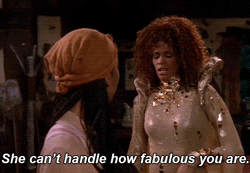
#cinderella is dead#kalynn bayron#young adult fantasy#ya fantasy#feminist ya#lgbtq ya#own voices#cinderella#book review#smash the patriarchy
3 notes
·
View notes
Photo

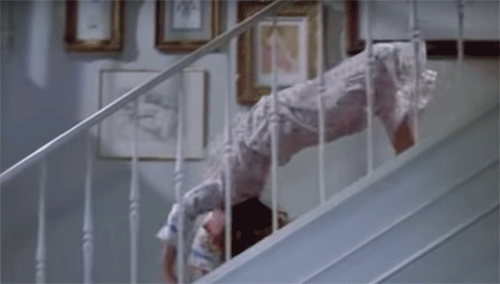
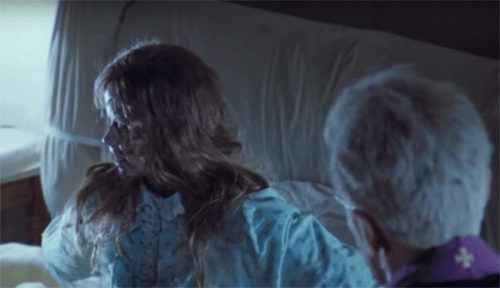


The Exorcist (William Friedkin, 1973)
Feminist Horror Film Review by TheFinalGirlSpeaks
“But while the theme of spiritual decline is central to The Exorcist, it is secondary to the film’s exploration of female monstrousness and the inability of the male order to control the woman whose perversity is expressed through her rebellious body.” (Barbara Creed, The Monstrous Feminine, 1993)
On a dark, misty night, lit only by a single streetlamp, a lone priest stands on a deserted pavement, gazing up at the window of a child’s bedroom. This is the iconic image we have all come to associate with The Exorcist (Friedkin, 1973). Except not the image, nor the only character displayed in it, nor the title, are the subject of the film. The Exorcist poster misleads the spectator into believing that they will be watching a film about a tenacious ghost-hunter, rather than a story about a little girl hurled into a terrifying demonic ordeal. This initial misdirection is just the tip of an iceberg of what’s to come. Throughout the film, the female characters are repeatedly pushed into degrading, secondary roles. They loiter in the background, serving either as tools through which the male characters can deal with their troubles, or more often, as the weapons of castration.
The Corrupted Virgin A virgin woman in a horror film is a precious and coveted tool. She, unlike her harlot friends, has the clarity of mind to get away from her attempted killer. Unburdened by the haze of lust that clogs the brain of the non-virgin, the virgin can see that the killer is more likely to catch her if she runs up the stairs than if she sprints out the door towards her neighbours with the AK-47 and steel shutters. She is coveted by all, including the villain, but entirely unattainable, thanks to her good sense of morality, and her determination to abstain from intercourse until the wedding night. In The Exorcist, our virginal heroine is not the typical prudish, down-to-Earth teen ignoring her pubescent urges, but a girl of just twelve, too young to be thinking of anything other than the pet horse she covets, or picnics by the river. In the first twenty minutes of the film, Regan’s childishness is brought firmly to our attention. She play-fights with her mother, displays naïve ignorance towards the true purpose of an Ouija Board, and even steals actual cookies from the jar. Friedkin deliberately presents Regan as a sweet, pure little girl; in proving her total, girlish innocence, he is able to maximise the horror of her eventual, and horrifying, corruption. The very first shot of Regan is a POV from Chris, her mother, creeping into Regan’s bedroom as she sleeps. The little girl is shown laid in the bed that will later become the scene of the worst horror. Her covers are thrown off her, exposing her small body, in only a nightdress, to the cold night air rushing in through the open window. In Gothic literature, wind penetrating the castle walls is a common trope, an allusion to the oncoming (though rarely explicit) sexual penetration of the Gothic heroine – usually a young, innocent virgin. For Regan to be so openly exposed to the open window in the very first scene we see her, implies her incoming (or perhaps already happening) penetration by whatever demon later makes itself known inside her body. Even the shot itself has nauseating similarities to pornographic ‘POV’ videos, where men secretly approach their young, sleeping female conquests, before defiling them. As Andrew Scahill points out in the excellent essay ‘Demons Are A Girl’s Best Friend’, Regan is often seen wearing a particular shade of blue, “reminiscent of the Virgin Mary but also, perhaps more blasphemously to the secular crowd, Dorothy Gale”. Either way, the purpose of this costume choice is clear: Regan is an innocent, pure, virgin, ready for corruption. Whilst this might be enough for some to find Friedkin’s vision unimaginably grotesque, there are further explorations in his misogyny within the film that I will attempt to unravel.
The Helpless Mother Despite her necessity to the plot, The Helpless Mother is always an infuriating character to watch. She flails her way through the film, usually the only person who - at least at first - can see the horror for what it is. Typically however, she behaves so hysterically in response that she is never believed until it’s too late. In The Exorcist, The Helpless Mother is Chris MacNeil, a beautiful, young actress living with her daughter and a multitude of staff, but – horror of horrors – no husband. Chris is at once presented as the liberally-minded harlot of the film, attracting demonic attention with her sinful determination to go against the grain of heterocentric society. Chris is divorcing her husband, non-discreetly, arguing with him on the phone and cursing him openly to her ‘secretary’, Sharon (more on her later). She leaves her child in Sharon’s care whilst she swans about on a film set, instead of looking after Regan herself. She has short hair (often symbolic of a woman getting a little too independent for her own good – see Rosemary Woodhouse), and has an unsuitably superficial career. Chris MacNeil is, in society’s eyes, enough of a stain on the proper order of things to deserve everything she gets. By choosing to remain man-less, Chris has created a perfect environment for a demon to invade, as without a mighty male presence around, who will fight off the forces of evil threatening the young and vulnerable? The women? – pah! The Helpless Mother is, inherently, unable to protect against the dark force threatening herself and her child. She must, after a long, screechy, but valiant attempt to overcome her womanly limitations, seek help from the nearest available man. Chris’ helplessness is first symbolised by a futile attempt to close Regan’s bedroom window (it is found open multiple times throughout the film), which, as we have previously deduced, is likely letting in more than just a chill. Even in the opening scenes, the house that Chris has provided for herself and her daughter is shown to be sub-standard; she cannot run the house without her servants, cleaners, cooks and other staff, and the seals that should be protecting them from the outside world are easily broken into. Interestingly, and unusually, Chris is not the only helpless mother-figure running about during the drama. Sharon Spencer, who claims to be both Regan’s tutor and Chris’ secretary, matches Chris’ level of incompetence. Both Sharon and Chris wail and run about the house together, each high off of the other’s terror, at a loss for how to handle Regan’s new-found penchance for spewing curse words and bodily fluids, interspersed with crucifix-masturbation. I bring Sharon to the forefront of the viewer’s attention for the simple reason that, at first, she seems totally irrelevant. The Helpless Mother position has already been filled, and she serves no real purpose other than keeping true to the original novel, . However, I propose we view Sharon’s odd, insistent presence from a new perspective. What is the one thing that threatens a heterocentric society more than a single, faithless, liberal mother? A single, faithless, liberal, lesbian mother. Whilst it may not be explicit – and no doubt Friedkin had no interest in dwelling on a dull female-only relationship when he could be exploring the tortured mindset of our male lead – in my view, Sharon and Chris are, for the duration of the film, Regan’s parents. Sharon is conspicuously there, in exactly the place where the mysterious, and absent, ex-husband should be. Sharon cares for Regan, she greets Chris when she arrives home from work, and she is the emotional support Chris seeks after Burke’s death. She lives in the house, with Chris and Regan, and remains there throughout the entire ordeal. Presumably, as a mere ‘secretary’ and ‘tutor’, Sharon would be well within her rights to slip out when the horror gets too much, and claim that battling a Demon does not fall under her job description. Instead, Sharon is just as invested as Chris in Regan’s plight - and why wouldn’t she be? Regan is, essentially, her daughter too. So, The Exorcist gives us not one, but two Helpless Mothers. The only adult, non-elderly women with actual roles, and neither of them possess any depth or real purpose except warming up the stage for the men.
The Misogynistic Hero Embodying the film’s intrinsic disrespect for women is our male hero, Father Karras. A troubled priest, caught between the torturous realisation of his shaken faith, and caring for his elderly mother. It is clear to me that, due to his current state of inner turmoil, Karras is quite possibly the worst person for the job of expelling a Demon from a young girl’s body. Due to the forced celibacy of his profession, and worsened by his growing loathing for his burden of a mother, Father Karras is consumed by his hatred for the female sex; it is this hatred, rather than a desire to save Regan from a hellish fate, that drives him. Karras’ mother (hereafter referred to as ‘Mother Karras’) is, presumably, the only woman that Father Karras has ever had any sort of close relationship with. Aside from the women in his congregation, whom he would likely have to remain professionally distant from, he would have no reason, as a Priest, to engage with a woman in any meaningful way. Consequently, for Father Karras, his mother’s words and actions are not just her own; she speaks for herself, and all women. It is, of course, just as things with Regan are worsening, that Mother Karras is taken, against her will, to a (terrible) psychiatric ward, filled with more decrepit old women, half-mad from their varying stages of dementia. Throughout the film, beginning with the opening Iraq setting, elderly (often cloaked, wisened) women are repeatedly used as symbols of fear. As Barbara Creed points out in her analysis of The Exorcist in ‘The Monstrous Feminine’, “the sense of foreboding seems to be particularly linked to the sinister, robed figures of these women who, in this context, take on the stereotypical features associated with the witch as hag or post-menopausal woman – black dress, hump, wrinkled face, toothless grin.” (Creed, 1993). Aside from this being true of Mother Karras, one could even make the argument that, as the possession reaches its climax, Regan loses her youthful appearance, and becomes haggard, sickly, ugly, her voice deepening, her body twisting in an unnatural, arthritic way. In the asylum, one of these dementia-riddled ‘hags’ even snatches Father Karras’ Priest collar, thereby stripping him of his purpose. In the next moment, his mother strips him of the only thing he has left, his manhood, by disgustedly chiding him for not being able to afford her proper care. Father Karras is left alone with the consuming guilt of failing his mother in her final days (she dies soon after), and with it, a burning anger towards her for blaming him so unfairly, and in doing so, draining him of his masculinity. With Mother Karras gone, not even graspable in the nightmares in which she haunts him, Father Karras’ fury spreads beyond just her, to the sex she represents: women in general, and specifically one young girl, whose poorly timed possession tale will land her right at his mercy. Regan Macneil, on the brink of womanhood - and thus, in Karras’ eyes, on the brink of becoming an emasculating witch - is the perfect summation of everything Karras cannot stand. With the Demon’s targeted taunts falling, jarringly, from her young mouth – “your mother sucks cocks in hell!” stands out as a particularly provocative jibe – Regan becomes Karras’ perfect little punching bag. He is even freed of the irritating shackles that might normally prevent a fully-grown man from beating up a twelve-year-old, because wait, she’s not a child, she’s a Demon.
From a Mulvey perspective, the male gaze here is shockingly twisted. The men in the audience, watching the climactic scenes of this film, are able to place themselves in the shoes of Father Karras (a Priest! He must be on the side of the goodies, right?), and join him in his cathartic expulsion of rage against a little girl. The pleasure in watching this derives from the liberation of a male desire to beat her back from the edge of pubescence, to keep her as an innocent and controllable child. It is no accident that Regan is on the verge of her climb into adulthood. A 2010 article titled ‘What The Ever-Popular Exorcist Says About Female Sexuality’ states that, “as the film unravels, the text begs the question, ‘Why is there evil in a world God created,’ while the subtext asks, ‘Is there anything more terrifying than a teenage girl?’”. The answer, for many men, is no. A young girl, realising her female independence, discovering her sexuality, her womanhood, her strength – this is the moment a man wishes, subconsciously, he could crush. In Regan MacNeil, it is acceptable to do so, because the adolescent-like Demon lurking within her is not just an awakening libido and a desire to sulk, wear short skirts, and sneak out after dark. It is, according to the Priests and doctors, a real Demon, one that an everyman, like Father Karras, can use brute force to fight, and to banish for good.
15 notes
·
View notes
Link
(CNN)For 12 years Adelma Cifuentes felt worthless, frightened and alone, never knowing when her abusive husband would strike.But as a young mother in rural Guatemala with three children and barely a third grade education, she thought there was no way out.
What began as psychological torment, name-calling and humiliation turned into beatings so severe Cifuentes feared for her life. One day, two men sent by her husband showed up at her house armed with a shotgun and orders to kill her. They probably would have succeeded, but after the first bullet was fired, Cifuentes' two sons dragged her inside. Still, in her deeply conservative community, it took neighbors two hours to call for help and Cifuentes lost her arm.But the abuse didn't stop there. When she returned home, Cifuentes' husband continued his attacks and threatened to rape their little girl unless she left. That's when the nightmare finally ended and her search for justice began.
Guatamala's past still haunts
Cifuentes' case is dramatic, but in Guatemala, where nearly 10 out of every 100,000 women are killed, it's hardly unusual.
A 2012 Small Arms Survey says gender-based violence is at epidemic levels in Guatemala and the country ranks third in the killings of women worldwide. According to the United Nations, two women are killed there every day.There are many reasons why, beginning with the legacy of violence left in place after the country's 36-year-old civil war. During the conflict, atrocities were committed against women, who were used as a weapon of war. In 1996, a ceasefire agreement was reached between insurgents and the government. But what followed and what remains is a climate of terror, due to a deeply entrenched culture of impunity and discrimination. Military and paramilitary groups that committed barbaric acts during the war were integrated back into society without any repercussions. Many remain in power, and they have not changed the way they view women.Some 200,000 people were either killed or disappeared during the decades-long conflict, most of them from indigenous Mayan populations. Nearly 20 years later, according to the Security Sector Reform Resource Centre, levels of violent crime are higher in Guatemala than they were during the war. But despite the high homicide rate, the United Nations estimates 98% of cases never make it to court. Women are particularly vulnerable because of a deep-rooted gender bias and culture of misogyny. In many cases, femicide -- the killing of a woman simply because of her gender -- is carried out with shocking brutality with some of the same strategies used during the war, including rape, torture and mutilation.
Explosion in violence
Mexican drug cartels, organized criminal groups and local gangs are contributing to the vicious cycle of violence and lawlessness. Authorities investigating drug-related killings are stretched thin, leaving fewer resources to investigate femicides. In many cases, crime is not reported because of fear of retaliation. Many consider the Guatamalen National Civil Police, or PNC, corrupt, under-resourced and ineffective. Even if a case does get prosecuted, according to Human Rights Watch, the country's weak judicial system has proved incapable of handling the explosion in violence.
Prevailing culture of machismo
Perhaps one of the biggest challenges facing women in Guatemala is the country's deeply rooted patriarchal society.According to María Machicado Terán, the representative of U.N. women in Guatemala, "80% of men believe that women need permission to leave the house, and 70% of women surveyed agreed." This prevailing culture of machismo and an institutionalized acceptance of brutality against women leads to high rates of violence. Rights groups say machismo not only condones violence, it places the blame on the victim.
The political will to address violence against women is slow to materialize."Politicians don't think women are important," says former Secretary General of the Presidential Secretariat for Women Elizabeth Quiroa. "Political parties use women for elections. They give them a bag of food and people sell their dignity for this because they are poor."Lack of education is a major contributor to this poverty. Many girls, especially in indigenous communities don't go to school because the distance from their house to the classroom is too far.Quiroa says "They are subject to rape, violence and forced participation in the drug trade."
Signs of progress
Although the situation for girls and women in Guatemala is alarming, there are signs the culture of discrimination may be slowly changing. With the help of an organization known as CICAM, or Centro de Investigación, Cifuentes was finally able to escape her husband and get the justice she deserved. He is now spending 27 years behind bars.Cifuentes is using her painful past to provide hope and healing to others through art.Since 2008, she and four other abuse survivors known as La Poderosas, or "The Powerful," have been appearing in a play based on their real life stories.
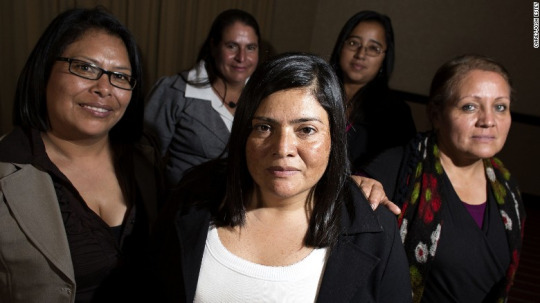
Five Guatemalan abuse survivors known as La Poderosas or "The Powerful" share their stories and help other women get support.
The show not only empowers other women and discusses the problem of violence openly, but it also offers suggestions for change. And it's having an impact. Women have started breaking their silence and asking where they can get support. Men are reacting, too. One of the main characters, Lesbia Téllez, says during one presentation, a man stood up and started crying when he realized how he had treated his wife and how his mother had been treated. He said he wanted to be different.The taboo topic of gender-based violence is also being acknowledged and recognized in a popular program targeting one of Guatemala's most vulnerable groups, indigenous Mayan girls. In 2004, with help from the United Nations and other organizations, the Population Council launched a community-based club known as Abriendo Oportunidades, or "Opening Opportunities". The goal is to provide girls with a safe place to learn about their rights and reach their full potential.Senior Program Coordinator Alejandra Colom says the issue of violence is discussed and girls are taught how to protect themselves. "They then share this information with their mothers and for the first time, they realize they are entitled to certain rights."Colom adds that mothers then become invested in sending their daughters to the clubs and this keeps them more visible and less prone to violence.The Guatemalan government is also moving in the right direction to address the problem of violence against women. In 2008, the Congress passed a law against femicide. Two years later the attorney general's office created a specialized court to try femicides and other violent crimes against women. In 2012, the government established a joint task force for crimes against women, making it easier for women to access justice by making sure victims receive the assistance they need. The government has also established a special 24-hour court to attend to femicide cases. On the global front, the International Violence Against Women Act was introduced in the U.S. Congress in 2007; it has been pending ever since. But last week the act was reintroduced in both the House and Senate. If approved, it would make reducing levels of gender-based violence a U.S. foreign policy priority.Pehaps the most immediate and effective help is coming from International nongovernmental organizations, which are on the front lines of the fight against gender-based discrimination in Guatemala.
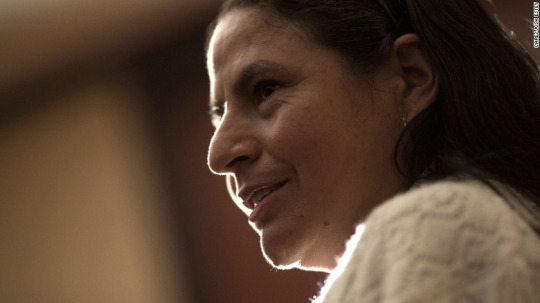
Adelma Cifuentes shares her story to empower women and bring about awareness of Guatemala's history of gender-based violence.
Ben Weingrod, a senior policy advocate at the global poverty fighting group CARE, says, "We work to identify and challenge harmful social norms that perpetuate violence. Our work includes engaging men and boys as champions of change and role models, and facilitating debates to change harmful norms and create space for more equitable relationships between men and women."But the job is far from over. While there is tempered optimism and hope for change, the problem of gender-based violence in Guatemala is one that needs international attention and immediate action.Cifuentes is finding strength through the theater and the support of other abuse survivors, which has allowed her to move forward. But millions of other women trapped in a cycle of violence are facing dangerous and frightening futures. For them, it's a race against time and help cannot come soon enough.
3 notes
·
View notes
Text
In 'Grace and Frankie' Season 3, More of the Same (But Jane Fonda Gets High)
i wrote about the new season of “Grace and Frankie” but you’re better off watching “The Golden Girls.”

Last month Hulu began streaming every episode of "The Golden Girls." More than three decades after its premiere, the seminal sitcom remains every bit relevant, topical and -- most importantly -- hilarious.
Time may have passed but "The Golden Girls" is still deeply funny with its four main ladies tackling serious issues in just 22 minutes (or under). From confronting one's own death, to commenting on the AIDS crisis and beyond, almost every episode of "The Golden Girls" (at least in its early run) handled a sensitive topic with careful precision and unexpected deftness. That the show's writers, crew and stars managed to unpack important topics in a short runtime solidified "The Golden Girls" as one of the best sitcoms.
It's impossible not draw connections between "Grace and Frankie," which enters its third season on Netflix Friday, and "The Golden Girls," especially since the latter sitcom is finding a new and younger audience via Hulu. Despite delightful performances from its stars Lily Tomlin and Jane Fonda, "Grace and Frankie" is ultimately mostly surface level, missing opportunity after opportunity to thoroughly explore issues the show presents.
Season 3 is no different.
"Grace and Frankie" isn't fully averse to taking risks, however. The main plot this season finds Grace (Fonda) and Frankie (Tomlin) starting a business together. Not just any business -- the duo want to make a line of vibrators specifically aimed at senior woman who have hand and joint problems. The idea came to Grace -- an experienced businesswomen who ran her own makeup company before retiring -- in Season 2 when she had an arthritis flare up after using her own sex toy. And of course, Frankie is all in on the wild idea.
Finding the $75,000 they need to launch for Vybrant, an excellent name for a vibrator company, becomes more difficult than Grace and Frankie anticipated. The women face ageism, and even misogyny, while getting turned down for loans.
"Oh, my god! I know what's going on here," Grace exclaims after a banker won't give them a 10-year loan. Instead, he pushes for a one-year loan.
"Me too: This is about you being afraid of female sexuality," Frankie chimes in.
"He's not going to give us a loan because he think's we're too old," Grace says. Frankie begs to differ, telling the banker she "was blasting Drake on the way here."
"This is ageist bullshit," Grace fires back.
After a little back-and-forth, the women leave the bank defeated, offering nothing more than a pout and some one-liners before heading back to the drawing board to think of new ways to get money. It's hard not to imagine Bea Arthur's Dorothy in this situation: With a ferocious wit and a stern glare, she'd undoubtedly give the naysayers a piece of her mind and get that loan.
Later on in the season (Netflix shared the first six of 13 episodes for review), Grace and Frankie come home to find their house burgled. The women react to the invasion of privacy in different ways: Grace is levelheaded but Frankie is shaken the core. During a police investigation, Grace lets it slip that she owns a gun and Frankie freaks out. She's staunch in her stance on guns and orders Grace to get rid of it. Grace promises she'll dispose of the weapon but lies.
Over the next few episodes, we see how the women cope with the crime. Frankie can't sleep alone at night and Grace is determined to help her friend. Together, they take classes at the local community center to learn how to defend themselves (they're told to soil themselves if they encounter a perpetrator) and how to prevent another robbery. Of course, it eventually comes out that Grace still has her firearm, causing a major rift between the besties.
"Grace and Frankie" never gets too dramatic and doesn't peel back the layers of its main characters. The women argue, with Frankie holding her ground, saying she won't live with Grace until she tosses out the gun. Grace doesn't make things any better: With the help of her daughters, Grace decides to poke Frankie's buttons by smoking her pot (in one of the funniest moments of the season, we see Jane Fonda act high as a kite). This sets off Frankie because Grace promised Frankie if she were to ever smoke, she'd do it with her.
While there's no doubting Fonda and Tomlin are shining stars in every scene, it's not enough to make up for the show's misgivings. "Grace and Frankie" fails to use the situation as a teachable moment and doesn't dive deeper into the issue of gun violence and safety. Instead, the show takes the easy way out, playing the fight for laughs. Moment-to-moment, "Grace and Frankie" offers plenty of giggles aimed at a broad audience but unlike other modern sitcoms ("Black-ish," "Transparent," "One Day at a Time," "Fresh Off the Boat") the show doesn't leave a lasting or meaningful impression.
It's hard to come down too hard on "Grace and Frankie." As always, Tomlin and Fonda still have that rare chemistry that first captivated audiences in the 1980 comedy "9 to 5." And the series also did the smart thing by shinning a spotlight on June Diane Raphael, who plays Grace's sassy and complex daughter Brianna. In Season 3, she gets what feels like a bigger role than the past two installments. Here, she wrestles with her feelings about having children and starting a family and becomes an integral part of helping Grace and Frankie get their business off the ground.
"Grace and Frankie" suffers most when Fonda, Tomlin or Raphael aren't on camera. The relationship between Grace and Frankie's ex-husbands, Robert (Martin Sheen) and Sol (Sam Waterston), is one of the worst depictions of a marriage -- straight or gay -- on TV. Unrealistic, trite and grating, the dynamic between the two men feels like it was lifted from a 50s sitcom and applied to today's progressive world. Sol is often whining or being unreasonably jealous of Robert's desires: Robert is cast in a community theater production of the musical "1776" but Sol doesn't get a part. Robert frets how he'll tell his partner; rightfully worrying that Sol will throw a tantrum. After breaking the news, Sol is initially upset but comes around to it, telling Robert, "I'll play the role of supporting husband." Ick.
Sol later gets jealous when he learns Robert is going out for "drinkies" with his theater pals. Wanting to be part of the crew, and not allowing Robert to have his own social life, Sol aggravatingly guilt trips his husband into inviting his friends over to their new home. This plays out like a banal scene from "I Love Lucy" but with gay men. Sol reveals to Robert's new friends he was married to a woman for 40 years -- they had no idea -- and Robert gets upset. After cooling down, the incident sparks Robert to come out to his mother, a devout Catholic. Yes -- a coming out scene in 2107. Again, "Grace and Frankie" avoids delving into any interesting issues older gay men might face today and instead opts for a moment LGBTQ audiences have seen time and time again.
Like many smaller Netflix original series, "Grace and Frankie" probably built its own specific audience over the last two years. The streaming service doesn't share its ratings but it's safe to say this half-hour comedy has devoted fans who will binge the show for light laughs and Tomlin and Fonda's star power. And that's OK; "Grace and Frankie" is harmless and does what it sets out to do perfectly fine.
One of the most interesting things about the current TV landscape is that new shows aren't just battling each other for your attention -- they're also up against every series and film backlogged on streaming services. With hundreds of shows from which to choose, audiences are pickier than ever when it comes to their TV diet. And when faced between watching the new season of "Grace and Frankie" or binging on "The Golden Girls," the answer seems pretty obvious.
3 notes
·
View notes
Link
Tuto Quiroga, former vice president of the dictator Banzer and currently a representative of the CIA and the US embassy, articulates, without any legitimacy, the legal and political decisions regarding the upcoming elections. Fernando Camacho, president of the Pro Santa Cruz Civic Committee, through the Secretaries of the Presidency, Jerjes Justiniano, defensor of mass rape, and through the Secretary of Defense and other members of the cabinet who take military decisions. Two examples of these decisions are the decree which allows the Army permission to kill, making them immune of any legal consequences and causing the militarization of the entire country. The other decree transfers more than 30 million bolivianos [money] to the Army in order to buy weapons as if it civil war is coming. Samuel Doria Medina, through the Secretary of Government, and the Chancellor, are responsible for making-up the situation for the international community and for threatening. Carlos Mesa serves them coffee, who attends their meetings to give them a legitimacy that these characters do not have. None of these three characters have any position in the Bolivian democracy, not even a bench in the parliament, but they are at the head of a government which wants to force a fascist plan in order to take decisions about the lithium deposit and to install from Bolivia a fascist neoliberalism throughout the continent. The next elections they announce only interest them if they can be used to simulate a democratic regime that has as its sole legitimacy the police-military occupation of all cities, thus it is essential that the Movement to Socialism participate in the next elections. If the elections do not work for them in the way they are expecting, these bloodthirsty characters, who threaten to accuse us of sedition, when they are the first ones in being so, will drag us into a civil war. The Plurinational Legislative Assembly, where the Al Socialism Movement has two thirds is today at the head of Eva Copa, an alteña woman, a UPEA student, who has had the responsibility of assuming such a difficult position. Evo Morales and Álvaro García Linera left a power vacuum and a stampede that reflect a clientelist regime with social organizations, which reflects the ideological and political limits of a project that no longer had popular content and has fallen by its own decay. The situation we live does not admit analysis such as “the good against the bad”. The victims are not part of the hierarchy of MAS here, as the reports of the deaths show; It is the nameless ones who are being killed. Do not dare to name them as martyrs of democracy, because their destiny is the mass graves of those who benefit from their death, such as Camacho or Morales, simultaneously. In Bolivia, the Lie governs, that’s why Roxana Lizárraga is the secretary of communications, she who had been involved in obscene fakenews feeds. Social psychosis campaigns are unleashed through WhatsApp that aims to rise fear and allow a more fascist visions in our daily lives, invading not only our State but also our bodies and emotions. Evo Morales no longer governs Bolivia, but his crime is not to be indigenous; his real crime is to have led a corrupt, ecocidal, misogynist and caudillista government. Now, the mediocrity and misogyny of Arturo Murillo govern. The ignorance and banality of Janine Añez governs. The colonial presence of the United Nations, the European Union or the OAS, govern; which without understanding anything of the complex Bolivian social situation, they run “pacification” plans that exclude civil society and the President of the Senate. The misinformation and looting of the State governs Bolivia. Widespread confusion governs Bolivia. Exacerbated chauvinism governs Bolivia. God has entered the palace to kill his sons and to give away and rape his daughters. The Bible has entered the palace at the hands of fanatics who read the Old Testament as a literal message and want to install the Law of Talion and the submission of women. María Galindo memeber of Mujeres Creando.
#bolivia#it's a dire situation#the army... the army... and the fucking corporations and USA so obscenely taking this oportunity to get all what they want for free#this reminds me of ethiopia... economical support of a civil war so they can loot lithium... so obvious#so gross.#latinoamerica
0 notes